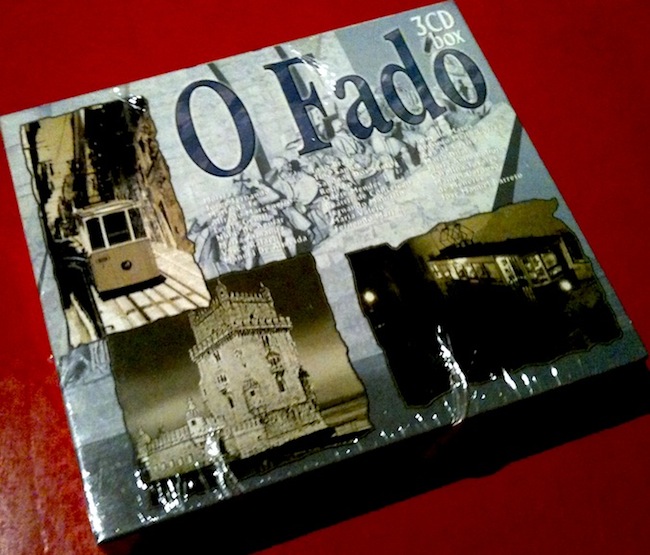Fado: The Blues Music of Portugal (3 Cd Boxed Set) New (1 More Boxed Set Left) SOLD!
Hi-Fi 4 Sale - Malaysia / Singapore Audio Forum & Marketplace | www.hifi4sale.net :: Audio & Video Equipment Marketplace :: Music & Video (CDs, DVDs, LPs, Blu-ray etc.)
Page 1 of 1
 Fado: The Blues Music of Portugal (3 Cd Boxed Set) New (1 More Boxed Set Left) SOLD!
Fado: The Blues Music of Portugal (3 Cd Boxed Set) New (1 More Boxed Set Left) SOLD!
The Following Item is for sale as a Boxed Set Consisting of 3 Cds.
This Boxed set is produced by World Connection (The Label that Discovered Mariza, now a superstar in her own right).

"This Set is not a budget/repacked version you'd find in supermarket, they are meticulously selected to showcase, talented singers
from a wide tonal spectrum, some are legends in their native land of Portugal, some are unknown to the masses outside of their nation,
nevertheless, music just like your soul will speak for itself" - Quinta Ruban
This Boxed Also Set Includes songs from Mariza & Christina Branco, two songstress who made it big on the world stage.
Fado : The Blues Music of Portugal (an excerpt)

The most widely recognized music of Portugal is fado, and it's been an extremely popular form among the Portuguese for nearly two centuries. Fado is a bluesy music that began to gain popularity among the urban poor of Lisbon in the 19th century. Brazilian and North African influences helped shape fado, as did Portuguese poetry and modinha ballads. The roots of Fado are frequently traced to Brazilian immigrants who brought their fofa and lundu dance music to Portugal in the early 1800s. Similar to Tango, Fado was initially perceived by the bourgeoisie as a disreputable, lower-class music.
The crucial instrument of Fado, the guitarra Portuguesa, is a 12-string guitar derived from a lute common to the Congo region of Africa.
This lute was carried by Africans to the Portuguese colony of Brazil during the 15th century during the early years of the slave trade. The instrument, having undergone some significant alterations over time, eventually made its way to Portugal. Africans and Afro-Brazilians
had favored their lute as an accompaniment to dance, but in Portugal musicians began to use the modified version of the instrument to accompany ballad singers, and this is the particular milieu in which Fado was born.
Consequently, the instrumental roots of Fado can be traced back to the 15th century. Fado remains first and foremost music for voice and guitar. Bass, violin, viola, and/or cello are frequent contributors to modern Fado, and percussion is used quite effectively by some arrangers. As for the literary, or lyrical, component of Fado, again we find the thematic soul of the music represented in poetry that dates to the 15th century and the writings of Luís Vaz de Camões.
The essence of this poetry is the quality of saudade – a word that does not readily translate into other languages. The difficulty stems from the fact that the word saudade expresses a range of emotions – loneliness, melancholy, longing, even a fatalistic view of loss. Saudade evokes love in ruins or a bittersweet nostalgia for persons or events lost in the past. Fado is a somber, sometimes mournful, music that,
like the American blues, gives voice to heartache and disappointment. When sung well, it can be wonderfully emotive and moving.
While the instrumental and literary attributes of Fado can be reliably traced back to the Early Modern era, the emergence of Fado as a modern genre has been more elusive. It may have been happening in Brazil in the early 19th century, and if so Fado made its way into the working class districts of Lisbon, such as the Alfama and Alcântara, neighborhoods, quite rapidly.
We know with certainty that the legendary Maria Severa was singing Fado in her mother's tavern in the Alfama district in 1836. Severa, often cited as the mother of Fado, beguiled the aristocratic Conde di Vimioso with her singing, and the result was an illicit love affair that crossed class lines in a most unacceptable manner. Severa died in 1846 at age 26 from either suicide or tuberculosis, depending on which source one consults, but evidently broken-hearted over her turbulent love affair with Vimioso. Her love life was the stuff Fado is made of. Severa also began the tradition of female fadistas and was noted for wearing a black shawl when she sang. Most modern fadistas continue to wear a black shawl in honor of Severa.
Fado is distinctly Portuguese and, even more specifically, it is largely the musical legacy of Lisbon and Coimbra. Coimbra, located northeast of coastal Lisbon, is a venerable university town, known for its intellectual climate and artistic refinement. Coimbra Fado has consequently attracted a more effete audience than Lisbon Fado, where the music has always found its greatest support among the working class. For Americans, a useful distinction would be to compare the followers of Lisbon Fado to Blues fans, and the followers of Coimbra Fado to Folk music fans - Phillip Van Vleck (National Geographic Music Department)
Actual Item for Sale :
1.O Fado - A 3 Cd Anthology of Fado Music - Various (World Connection - Made in Europe)

PRICE : RM 65.00 for the entire LOT (non negotiable)
*Items purchased from Quinta Ruban are not returnable, we are basically clearing out stocks with labels our contracts have ran out.
*Shipping is Possible, but cost must be born by you.
*All Items are Original
*I would prefer a very straight-forward transaction with no haggling, best if you are in the Klang Valley and we should
do our level best to deliver the items to you free of charge.
*PM (Inbox) Us if our items interests you, first come first serve basis and no "auction" styled business.
Yours Truly,
Quinta Ruban
This Boxed set is produced by World Connection (The Label that Discovered Mariza, now a superstar in her own right).

"This Set is not a budget/repacked version you'd find in supermarket, they are meticulously selected to showcase, talented singers
from a wide tonal spectrum, some are legends in their native land of Portugal, some are unknown to the masses outside of their nation,
nevertheless, music just like your soul will speak for itself" - Quinta Ruban
This Boxed Also Set Includes songs from Mariza & Christina Branco, two songstress who made it big on the world stage.
Fado : The Blues Music of Portugal (an excerpt)

The most widely recognized music of Portugal is fado, and it's been an extremely popular form among the Portuguese for nearly two centuries. Fado is a bluesy music that began to gain popularity among the urban poor of Lisbon in the 19th century. Brazilian and North African influences helped shape fado, as did Portuguese poetry and modinha ballads. The roots of Fado are frequently traced to Brazilian immigrants who brought their fofa and lundu dance music to Portugal in the early 1800s. Similar to Tango, Fado was initially perceived by the bourgeoisie as a disreputable, lower-class music.
The crucial instrument of Fado, the guitarra Portuguesa, is a 12-string guitar derived from a lute common to the Congo region of Africa.
This lute was carried by Africans to the Portuguese colony of Brazil during the 15th century during the early years of the slave trade. The instrument, having undergone some significant alterations over time, eventually made its way to Portugal. Africans and Afro-Brazilians
had favored their lute as an accompaniment to dance, but in Portugal musicians began to use the modified version of the instrument to accompany ballad singers, and this is the particular milieu in which Fado was born.
Consequently, the instrumental roots of Fado can be traced back to the 15th century. Fado remains first and foremost music for voice and guitar. Bass, violin, viola, and/or cello are frequent contributors to modern Fado, and percussion is used quite effectively by some arrangers. As for the literary, or lyrical, component of Fado, again we find the thematic soul of the music represented in poetry that dates to the 15th century and the writings of Luís Vaz de Camões.
The essence of this poetry is the quality of saudade – a word that does not readily translate into other languages. The difficulty stems from the fact that the word saudade expresses a range of emotions – loneliness, melancholy, longing, even a fatalistic view of loss. Saudade evokes love in ruins or a bittersweet nostalgia for persons or events lost in the past. Fado is a somber, sometimes mournful, music that,
like the American blues, gives voice to heartache and disappointment. When sung well, it can be wonderfully emotive and moving.
While the instrumental and literary attributes of Fado can be reliably traced back to the Early Modern era, the emergence of Fado as a modern genre has been more elusive. It may have been happening in Brazil in the early 19th century, and if so Fado made its way into the working class districts of Lisbon, such as the Alfama and Alcântara, neighborhoods, quite rapidly.
We know with certainty that the legendary Maria Severa was singing Fado in her mother's tavern in the Alfama district in 1836. Severa, often cited as the mother of Fado, beguiled the aristocratic Conde di Vimioso with her singing, and the result was an illicit love affair that crossed class lines in a most unacceptable manner. Severa died in 1846 at age 26 from either suicide or tuberculosis, depending on which source one consults, but evidently broken-hearted over her turbulent love affair with Vimioso. Her love life was the stuff Fado is made of. Severa also began the tradition of female fadistas and was noted for wearing a black shawl when she sang. Most modern fadistas continue to wear a black shawl in honor of Severa.
Fado is distinctly Portuguese and, even more specifically, it is largely the musical legacy of Lisbon and Coimbra. Coimbra, located northeast of coastal Lisbon, is a venerable university town, known for its intellectual climate and artistic refinement. Coimbra Fado has consequently attracted a more effete audience than Lisbon Fado, where the music has always found its greatest support among the working class. For Americans, a useful distinction would be to compare the followers of Lisbon Fado to Blues fans, and the followers of Coimbra Fado to Folk music fans - Phillip Van Vleck (National Geographic Music Department)
Actual Item for Sale :
1.O Fado - A 3 Cd Anthology of Fado Music - Various (World Connection - Made in Europe)

PRICE : RM 65.00 for the entire LOT (non negotiable)
*Items purchased from Quinta Ruban are not returnable, we are basically clearing out stocks with labels our contracts have ran out.
*Shipping is Possible, but cost must be born by you.
*All Items are Original
*I would prefer a very straight-forward transaction with no haggling, best if you are in the Klang Valley and we should
do our level best to deliver the items to you free of charge.
*PM (Inbox) Us if our items interests you, first come first serve basis and no "auction" styled business.
Yours Truly,
Quinta Ruban
Last edited by quintaruban on Thu Jun 02, 2011 10:20 pm; edited 2 times in total

quintaruban- Dealer\Reseller\Trader\Service Provider

- Number of posts : 242
Age : 44
Location : Petaling Jaya
Registration date : 2011-02-20
 Re: Fado: The Blues Music of Portugal (3 Cd Boxed Set) New (1 More Boxed Set Left) SOLD!
Re: Fado: The Blues Music of Portugal (3 Cd Boxed Set) New (1 More Boxed Set Left) SOLD!
ALERT : We found another copy of this exact box set, which might as well be the last copy in our warehouse.

quintaruban- Dealer\Reseller\Trader\Service Provider

- Number of posts : 242
Age : 44
Location : Petaling Jaya
Registration date : 2011-02-20
 Similar topics
Similar topics» Bing Crosby in Hollywood (3 CD Boxed Set) - SOLD!
» New & boxed Keith Monks M9BA Mk 3 unipivot arm-SOLD
» Junior Wells' Chicago Blues Band/Hoodoo Man Blues LP
» CD Interface Mat(sold 1 left 1)
» R.E.M. Live Triple Vinyl LP Boxed Set + DVD (Used)
» New & boxed Keith Monks M9BA Mk 3 unipivot arm-SOLD
» Junior Wells' Chicago Blues Band/Hoodoo Man Blues LP
» CD Interface Mat(sold 1 left 1)
» R.E.M. Live Triple Vinyl LP Boxed Set + DVD (Used)
Hi-Fi 4 Sale - Malaysia / Singapore Audio Forum & Marketplace | www.hifi4sale.net :: Audio & Video Equipment Marketplace :: Music & Video (CDs, DVDs, LPs, Blu-ray etc.)
Page 1 of 1
Permissions in this forum:
You cannot reply to topics in this forum








